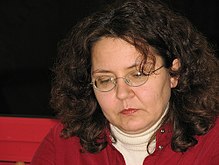Lena Karpunina
Lena Karpunina (* 1963 in Kaluga , Soviet Union ; † November 4, 2013 in Berlin ) was a Russian-German writer who wrote novels, short stories and narratives in Esperanto , which were recognized by literary prizes.
Life
Lena Karpunina grew up in Dushanbe . In 1986 she obtained an engineering degree from the Tajik State Polytechnic Institute and subsequently worked in companies in the automotive industry. In 1993 she moved permanently to Berlin, where she studied German linguistics at the Humboldt University from 1997 . Meanwhile married to a German Esperantist, she died at the age of 50 after a year of serious illness in her adopted home.
Literary work
In 1988 Karpunina learned Esperanto in Dushanbe and subsequently traveled to Esperanto events, initially in the Soviet Union and the former Eastern Bloc, and from 1990 also to the West. In 2000 her first volume of short stories and short stories, “La Bato” (“The Blow”), was published in Antwerp (2nd extended edition Moscow 2006). In 2007 the story “Neokazinta Amo” (“A love that did not take place”) followed. She published further novellas in general Esperanto magazines such as " MONTOO " (Antwerp) and "La Balta Ondo" (Internet edition of "La Ondo de Esperanto", Kaliningrad ) and in the literary magazine "Beletra Almanako" (New York).
Karpunina was a member of the Esperantlingva Verkista Asocio ( EVA, Association of Esperanto Writers , transformed into the Akademio Literatura de Esperanto ( ALE ), German Literary Academy of Esperanto ) in 2008 . In 2010 she was elected to the Akademio de Esperanto “especially for her services in the literary field” .
Awards and criticism
| year | category | Award | plant | German |
| 1997 | prose | 3rd prize | Yeah | Yasha |
| 1998 | prose | Honorable Mention | Miŝka Voropajev | Mishka Voropayev |
| 1998 | prose | Honorable Mention | Bela | Bela |
| 1999 | prose | 3rd prize | La ridinda letero | The ridiculous letter |
| 2001 | prose | 2nd prize | La pluvo en Ĉenstoĥovo | The rain in Czestochowa |
| 2001 | prose | 3rd prize | La demando de emancipiĝo | The question of emancipation |
| 2001 | prose | Honorable Mention | Mirt | Mirt |
| 2002 | prose | 2nd prize | Pro savo de homo | Because of a human rescue |
| 2012 | prose | Honorable Mention | La amnestipeto | The amnesty request |
The subject of their stories are in particular the often hard and emotionally cold life in Soviet Tajikistan and the isolation of people in a capitalist city using Berlin as an example. In an apparently simple, unaffected and laconic style, she traces human psychology and shows how people maintain their humanity even under the most adverse circumstances. As an example of the mostly depressing, oppressive and disturbing narrative world of Karpunina, reference can be made to the story “ Request for amnesty”: The fine- minded Gulag child Siwokon, deported to the Arctic Circle at the age of twelve, has been writing an application for release for over 30 years, even though he has long known that a corrupt inmate throws the prisoner's mail into the river. When Siwokon is about to be released, his world collapses. - After years in Berlin, Karpunina searches for traces of the civil war in Dushanbe in “Girl with the Apples”. The sports field of their former school is now a mass grave, but the people appear happy in the overflowing fruit and vegetable markets of the beloved, lively city. Whoever she asks, nobody speaks of "back then" until Uncle Aljoscha - drunk and depressed - tells how the paramilitaries ambushed the girls from the Pamir . - In the apartment building in the short story “In a big city”, the smell of corpses from Ansbach arouses Erika's interest in her long-term neighbor, although her husband Bernd complains that she should “not always hang on to everything”.
Works on the Internet
- The girl with the apples - translation in excerpts from “Mortpafitaj pomoj” about the civil war in Dushanbe.
- En granda urbo - In a big city (novella about a long unnoticed death in a Berlin apartment building), from MONTO (Antwerp)
- La amnestipeto - The request for amnesty (Novella awarded in the competition of fine arts of the Esperanto World Federation - Universala Esperanto-Asocio - 2012)
literature
- Sutton, Geoffrey. Concise Encyclopedia of the Original Literature of Esperanto - CEOLE ( Concise Encyclopedia of the Original Literature of Esperanto). New York: Mondial 2008, pp. 574-575.
Web links
Individual evidence
- ↑ Obituary in Libera Folio (in Esperanto)
- ↑ In April 1992 converted into the Tajik Technical University Muhamed Osimi, Tajik Донишгоҳи техникии Тоҷикистон ба номи М.С. Осимӣ .
- ↑ Oficiala Informo de la Akademio n-ro 23 de November 6, 2013
- ↑ Reviews of “La Bato” by Sten Johansson in La Espero (Sweden) 2002, Ales Gofen in Esperanto USA 4/2001, Guido van Damme in Horizontaal (Belgium) 1/2001, Yenovk Lazian in Esperanto (Esperanto World Federation, Rotterdam) 7/2001, Donald Broadribb (Australia) in MONTO (Antwerp) 4/2001 (all in Esperanto)
| personal data | |
|---|---|
| SURNAME | Karpunina, Lena |
| BRIEF DESCRIPTION | Russian-German engineer and Esperanto writer |
| DATE OF BIRTH | 1963 |
| PLACE OF BIRTH | Kaluga , Soviet Union |
| DATE OF DEATH | 4th November 2013 |
| Place of death | Berlin , Germany |
